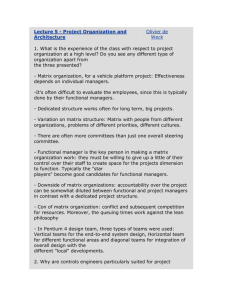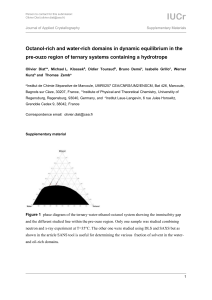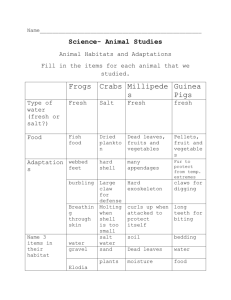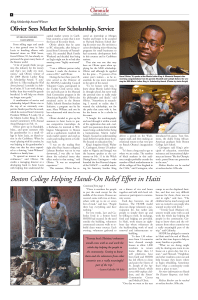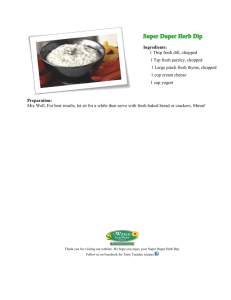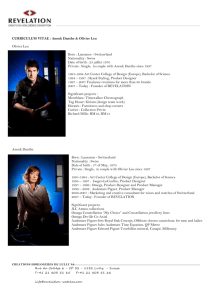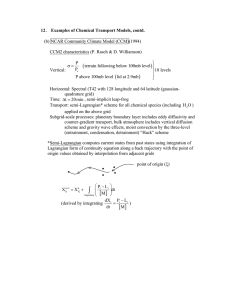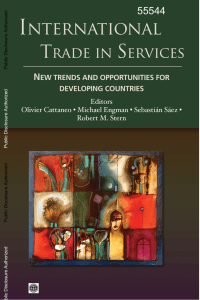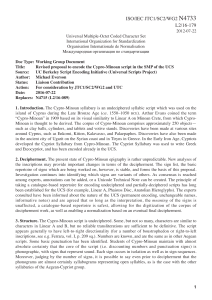DHLs-Fresh-Connection-Challenge-2013
advertisement
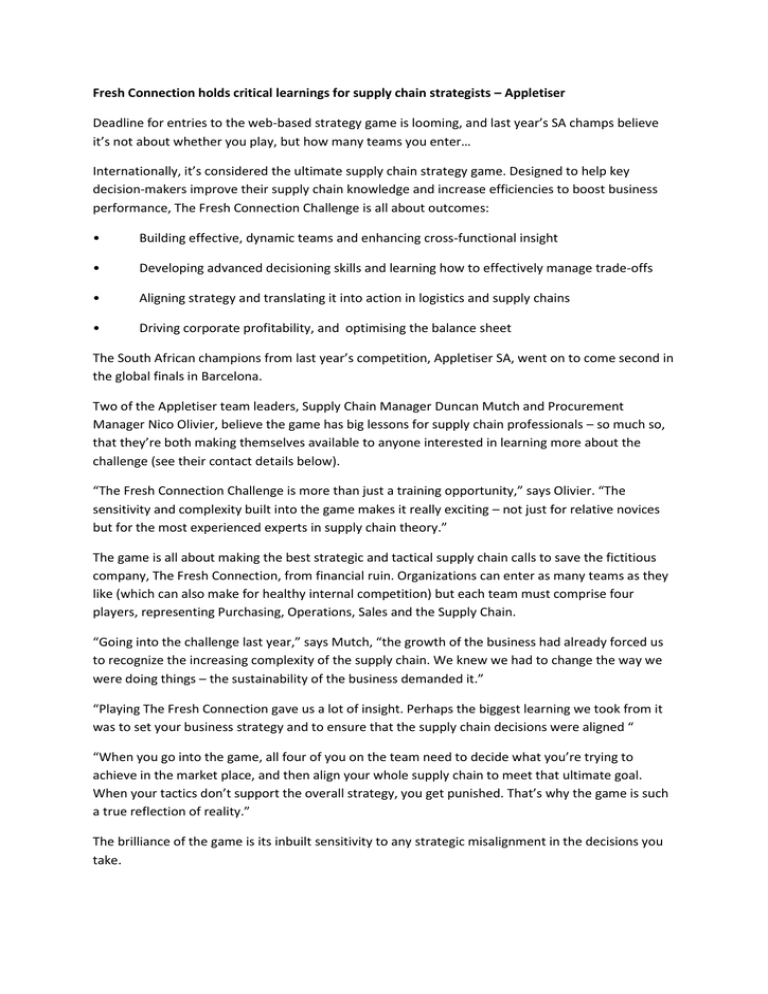
Fresh Connection holds critical learnings for supply chain strategists – Appletiser Deadline for entries to the web-based strategy game is looming, and last year’s SA champs believe it’s not about whether you play, but how many teams you enter… Internationally, it’s considered the ultimate supply chain strategy game. Designed to help key decision-makers improve their supply chain knowledge and increase efficiencies to boost business performance, The Fresh Connection Challenge is all about outcomes: • Building effective, dynamic teams and enhancing cross-functional insight • Developing advanced decisioning skills and learning how to effectively manage trade-offs • Aligning strategy and translating it into action in logistics and supply chains • Driving corporate profitability, and optimising the balance sheet The South African champions from last year’s competition, Appletiser SA, went on to come second in the global finals in Barcelona. Two of the Appletiser team leaders, Supply Chain Manager Duncan Mutch and Procurement Manager Nico Olivier, believe the game has big lessons for supply chain professionals – so much so, that they’re both making themselves available to anyone interested in learning more about the challenge (see their contact details below). “The Fresh Connection Challenge is more than just a training opportunity,” says Olivier. “The sensitivity and complexity built into the game makes it really exciting – not just for relative novices but for the most experienced experts in supply chain theory.” The game is all about making the best strategic and tactical supply chain calls to save the fictitious company, The Fresh Connection, from financial ruin. Organizations can enter as many teams as they like (which can also make for healthy internal competition) but each team must comprise four players, representing Purchasing, Operations, Sales and the Supply Chain. “Going into the challenge last year,” says Mutch, “the growth of the business had already forced us to recognize the increasing complexity of the supply chain. We knew we had to change the way we were doing things – the sustainability of the business demanded it.” “Playing The Fresh Connection gave us a lot of insight. Perhaps the biggest learning we took from it was to set your business strategy and to ensure that the supply chain decisions were aligned “ “When you go into the game, all four of you on the team need to decide what you’re trying to achieve in the market place, and then align your whole supply chain to meet that ultimate goal. When your tactics don’t support the overall strategy, you get punished. That’s why the game is such a true reflection of reality.” The brilliance of the game is its inbuilt sensitivity to any strategic misalignment in the decisions you take. “The temptation to step out of your strategy to take advantage of other opportunities is always there. But when you succumb to that temptation you are caught out and penalized straight away,” says Mutch. “In real life, the impact of your decisions might only be realized six months down the road. The game enables you to learn the quality of your decisioning at a much faster pace.” “It’s amazing how counter-intuitive some of your decisions are when you’re forced to align with the strategy, and yet they get the right results at the end of the day.” “It’s possible that this happens when you’re so in the moment that you lose sight of the overall objectives. What feels right in your gut given the immediate context isn’t right when you have your eye on the big picture. Paying more for your raw materials, but making sure you have the flexibility and reliability of the supplier, is a good example. Low-cost product doesn’t help you if the delivery isn’t there when you need it.” “In a way the game also challenges you to relook what kind of information dashboard you need to help monitor your strategy,” says Olivier. “Supply chain professionals often make the mistake of not studying the income statement and balance sheet as part of their analysis.” The Game vs Reality After the finals, the senior players from the Appletiser team sat down and agreed on what they had learned from the game and how they were going to apply those insights to the company strategy going forward. “Obviously it’s a lot harder to get the strategy aligned throughout the organization than it is in the game,” says Olivier. “You still have to contend with silos and individuals who don’t see how their objectives fit in with the strategy you’re trying to implement. It’s a real challenge to get all the various departments pulling in the same direction.” Olivier says that one of the great benefits of the game is that it forces you to ask questions and challenge every decision you make. “The game ultimately enabled us to develop a new culture within the organization – a culture of openness, of questioning and challenging each other to find the better solution.” “In real life you often find yourself contending with a mixture of urgent and important decisions to make. It’s easy to go into damage control mode which often clashes with your long-term objectives. The game taught us important lessons about this.” “In the finals in Barcelona, for instance, we had three rounds to play with very tight deadlines. You can’t analyze all the information you have at hand ad infinitum – maybe you don’t even have all the information available – and yet you are forced to make a decision. We made a tactical decision which went against our supply chain strategy and it came back to bite us.” Play the game The Qualification Stage takes place between March and April. The Global Challenge, which will see the overall SA champions fly to Turkey, takes place between 29 April and 7 June. The best- performing SA teams per industry sector will be honoured at Logistics News’ annual Achiever Awards. Industry sectors include: Agriculture, Automotive, Chemicals, Engineering & Manufacturing, Life Sciences & Pharmaceuticals, Mining, Oil & Gas, Renewable Energy, Retail, Consumables, Fashion & Apparel, Supply Chain Services and Technology. Register now The cost for entry per team of four is R7,500. To enter one or more teams register by 1 March at www.thefreshconnection.org.za For more information contact Emma Engelbrecht on 021 935 6600 or Emma.Engelbrecht@dhl.com For more insight on the game from a player’s perspective, contact Duncan Mutch (duncanm@appletiser.net) or Nico Olivier (nicoo@appletiser.net)
